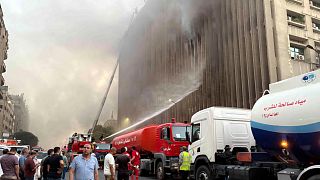Egypt
The last time Sabah Abd Rabu Hussein heard from her son, Yahia Saleh, he was planning to board a migrant vessel from conflict-ridden Libya to Europe.
That was two weeks ago.
The Egyptian housewife said on Sunday that she had begged him not to go, but that he had become fed up with living conditions in the village.
The 18-year-old was onboard an old fishing trawler that sailed from the town of Tobruk in eastern Libya on June 9.
His destination was Italy, like many other young men from his village in Egypt’s Nile Delta.
There were as many as 750 migrants including women and children on the boat that, instead of docking in Italy, capsized and sank off Greece in one of the deepest parts in the Mediterranean Sea.
Only 104 migrants survived the tragedy.
Greek authorities retrieved 78 bodies on June 14 and chances of finding anyone else alive have diminished.
The shipwreck appears to be one of the worst tragedies in the Mediterranean in recent history, raising questions and outrage over how European authorities have dealt with the influx of migrants in past years.
Like many relatives of those on board the fishing vessel, Saleh’s family don't know the fate of their son.
He was the second of four children born to a family of farmers, and left home less than a month ago without telling his family about his plans.
He surfaced in Libya.
His father Mohammed Saleh said the family's efforts to dissuade him from making the journey failed.
The family is from Ibrash, in the agricultural Nile Delta province of Sharqia, where water buffaloes, cows and donkeys share dirt roads with cars, motorbikes and three-wheeled rickshaws known as tuk-tuks.
Many of the area's young men and teenagers have made the perilous trip to Libya, hoping to cross the Mediterranean Sea to Europe.
Some of them managed to reach Italy, but many others were detained and returned to their homes, according to five villagers, all of whom spoke on the condition of anonymity for fear of being targeted by authorities.
Egypt, the most populous Arab nation with 105 million people, has sealed off its maritime borders for migrant boats following a 2016 deadly shipwreck off the Mediterranean town of Rosetta.
The government regularly tries to discourage its young men from illegal migration, but the country's economic crisis has motivated many to try to leave despite the dangers.












01:09
Dozens of migrants held for ransom by criminal gang in Libya released from captivity
Go to video
UN Migration Chief warns against ignoring root causes of migration
Go to video
Nearly 200 migrants intercepted off the coast of Senegal
01:25
Greece blocks asylum claims after surge in migrant arrivals
01:05
Migrant centre in landmark New York hotel closes down
01:06
Congo, Chad, Eritrea, Sudan and Somalia hit by U.S. travel ban